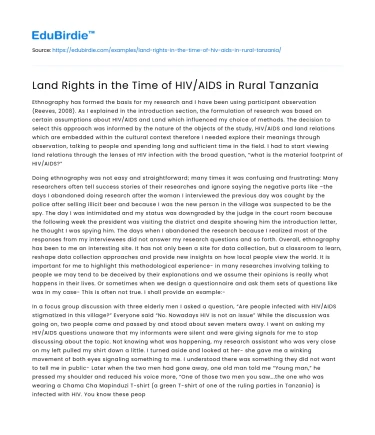Ethnography has formed the basis for my research and I have been using participant observation (Reeves, 2008). As I explained in the introduction section, the formulation of research was based on certain assumptions about HIV/AIDS and Land which influenced my choice of methods. The decision to select this approach was informed by the nature of the objects of the study, HIV/AIDS and land relations which are embedded within the cultural context therefore I needed explore their meanings through observation, talking to people and spending long and sufficient time in the field. I had to start viewing land relations through the lenses of HIV infection with the broad question, “what is the material footprint of HIV/AIDS?”
Doing ethnography was not easy and straightforward; many times it was confusing and frustrating: Many researchers often tell success stories of their researches and ignore saying the negative parts like –the days I abandoned doing research after the woman I interviewed the previous day was caught by the police after selling illicit beer and because I was the new person in the village was suspected to be the spy. The day I was intimidated and my status was downgraded by the judge in the court room because the following week the president was visiting the district and despite showing him the introduction letter, he thought I was spying him. The days when I abandoned the research because I realized most of the responses from my interviewees did not answer my research questions and so forth. Overall, ethnography has been to me an interesting site. It has not only been a site for data collection, but a classroom to learn, reshape data collection approaches and provide new insights on how local people view the world. It is important for me to highlight this methodological experience- in many researches involving talking to people we may tend to be deceived by their explanations and we assume their opinions is really what happens in their lives. Or sometimes when we design a questionnaire and ask them sets of questions like was in my case- This is often not true. I shall provide an example:-
Save your time!
We can take care of your essay
- Proper editing and formatting
- Free revision, title page, and bibliography
- Flexible prices and money-back guarantee
In a focus group discussion with three elderly men I asked a question, “Are people infected with HIV/AIDS stigmatized in this village?” Everyone said “No. Nowadays HIV is not an issue” While the discussion was going on, two people came and passed by and stood about seven meters away. I went on asking my HIV/AIDS questions unaware that my informants were silent and were giving signals for me to stop discussing about the topic. Not knowing what was happening, my research assistant who was very close on my left pulled my shirt down a little. I turned aside and looked at her- she gave me a winking movement of both eyes signaling something to me. I understood there was something they did not want to tell me in public- Later when the two men had gone away, one old man told me “Young man,” he pressed my shoulder and reduced his voice more, “One of those two men you saw….the one who was wearing a Chama Cha Mapinduzi T-shirt (a green T-shirt of one of the ruling parties in Tanzania) is infected with HIV. You know these people…if they hear you talking about their HIV infection you may add more burden too many problems they already have. You can make someone die quickly….” Another day on 1st December 2018 (AIDS Day) there was a campaign for free blood testing, I asked one of the three old men who was became my best friend to go for HIV test at Ushirombo. He gave excuses but when I insisted he refused. I asked him why and he said, “I don’t want to die early with stress if diagnosed and found with HIV… I don’t know what other people will say if they realize I am infected” I am writing this because if I was only asking in an interview, “are people stigmatized in this ward?” The obvious answer was “No”. Or for the question “Would you be willing to go for HIV test?” the obvious answer would certainly be, “Yes.” However, participant observation gave the difference. The difference is that relying only on the testimonies from interviewees has shortfalls especially due to speech challenges or sometimes people say things they don’t do (Jackson, 2013; Cornwall and Fujita, 2012)
Another important consideration when doing ethnography is to win the trust from the studied people and this trust can be gained when the gap between researcher and the researched is reduced. It is until the time the ‘researched’ no longer consider you as a ‘researcher’ but one like them. Initially as Clifford Geertz (1998) puts it, I encountered challenges during my research, many people refused to participate in my research and those who participated either gave short responses or replied to satisfy the intentions of my research. I was seen as an outsider, coming from town to fulfil research obligations and leave thereafter. - Like in the example of a woman selling illicit beer I interviewed and the next day she was caught by the police, everyone thought “that young man from Dar es Salaam might have reported this to the police” Long time staying in the field reduced the gap between the researched and the researcher, but the researcher needs also to learn how to reduce any differences between him/herself and the community he studies (Delamont, 2004). The thing which helped me to gain acceptance was to participate in their events such as local beer drinking, cultivation, religious activities, visiting the sick, attending court sessions and ward meetings






 Stuck on your essay?
Stuck on your essay?

